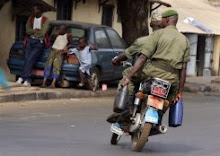A powerful five-man cabal is orchestrating a campaign of political abductions and disruption aimed at bringing a swift end to prime minister Morgan Tsvangirai's power-sharing government, according to senior diplomats in the country.
The chaotic first days of the new administration, in which cabinet posts are shared between President Robert Mugabe's Zanu-PF and Tsvangirai's Movement for Democratic Change, culminated in the arrest on Friday of the MDC deputy agriculture minister Roy Bennett, which happened as the cabinet was being sworn in at State House.
Bennett has now been charged with treason, reportedly in relation to an alleged 2006 plot to overthrow Mugabe. Human rights groups also said yesterday that scores of demonstrators were arrested in the southern city of Bulawayo as they held a Valentine's Day protest calling for reform. In the past few weeks, scores of Tsvangirai supporters and independent rights activists have been detained.
According to sources in Harare, the new wave of instability is the work of the Joint Operations Command (JOC), a five-man body comprising the chiefs of the army, air force, police, prisons and intelligence. Modelled on a secret command structure in the former Rhodesian regime, the JOC was revived in 1997 when Mugabe launched the "Third Chimurenga" (Struggle) to pacify liberation war veterans through patronage and political backing for land seizures.
Its five members, who vet everything from the daily front-page story in the Herald newspaper to monetary policy proposed by Reserve Bank governor Gideon Gono, are the most powerful men in the country. All five boycotted last Wednesday's and Friday's swearing-in ceremonies for Tsvangirai and the country's new ministers.
One African diplomat said: "The JOC is the real enemy of democracy. It obeys no laws and wants to send the signal that the MDC should not think that being in government offers it any sort of protection."
Tsvangirai condemned Bennett's arrest yesterday, saying, "His arrest ... raises a lot of concerns. It undermines the spirit of our agreement." But the new prime minister also hinted at hostile forces operating behind Mugabe. He said: "We have to budget for some residual resistance from those who see this deal as a threat to their interest."
He repeated calls for all political detainees to be released, an original condition of his joining the government, predicting that the issue would be a priority when the new cabinet ministers started work tomorrow. The first cabinet meeting has been set for Tuesday and, after the rocky beginning to the new administration, the prime minister claimed that the coalition cabinet could still make progress together. "Obviously with our history, we cannot immediately say we are the best of friends," he said. "As you begin to trust, the walls will start falling down."
Lawyers say Tsvangirai's pledge to secure the imminent release of 30 political prisoners puts him on a collision course with the JOC, which is using the detainees as a human shield against reform.
Human rights lawyer Dzimbabwe Chimbga said the prisoners, three of whom have been transferred to hospital, were "hostage to the JOC" which is more powerful than Mugabe as an individual or any institution of the power-sharing government. Observers believe the JOC is keeping the human rights activists in prison - by overruling successive court judgments - in order to negotiate amnesties for their own crimes.
The political prisoners, many of whom have been tortured, are active members of Tsvangirai's MDC or are human rights activists. Some have been in custody since October on trumped-up charges of bombing police stations or plotting the overthrow of the government by organising the training of insurgents in neighbouring Botswana. They include Jestina Mukoko, director of the Zimbabwe Peace Project.
After successive court hearings, Mukoko and two others, former Tsvangirai political assistant Gandhi Mudzingwa, and Fidelis Chiramba, 72, were sent to hospital last Thursday night.
Bennett, who was picked up on Friday at the Charles Prince airport near Harare, was one of the most provocative of Tsvangirai's ministerial nominees. He had only just returned from three years in South Africa after fleeing arrest on charges of masterminding a plot to kill Mugabe.
Perhaps the most powerful member of the JOC is the Zimbabwe Defence Forces Commander Constantine Chiwenga who controls the generals beneath him and ensures the armed forces get first call on food and fuel which are sold at favourable prices to parallel market operators who profit from shortages. Chiwenga controls paramilitaries and the "green bombers" who invade farms and intimidate peasants.
The group suffered one setback last week when parliament, where the MDC has a majority, approved a law creating a new National Security Council to be accountable both to the MDC and the Zimbabwe African National Union-Patriotic Front (Zanu-PF). The creation of the body was a condition of the South African-brokered unity deal signed last September.
Meanwhile, it has emerged that Tsvangirai may not be able to fulfil a pledge to pay public employees in dollars. The assertion flumoxed diplomats who questioned how the prime minister would raise the $50m monthly salaries bill, given the reticence of the international community to resume spending in the country. It now seems possible that Tsvangirai made the promise without having secured the money - either from Europe, the US, South Africa or his regional supporter, Botswana.
Source: Guardian

No comments:
Post a Comment